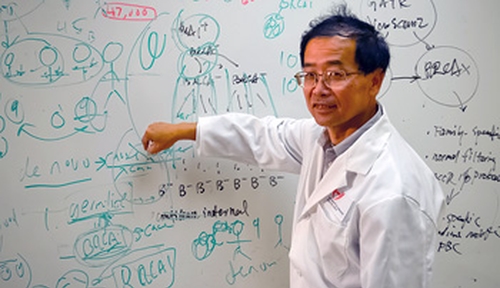Leukemia was his research niche until five years ago when breast cancer hit too close to home for San Ming Wang, M.D.
A relative’s wife had just been diagnosed with the disease; her mother and two aunts also had the disease.
Dr. Wang, associate professor of genetics, cell biology and anatomy, decided to switch his research to familial breast cancer after joining UNMC in 2010.
Now his research challenges the status quo approach to identifying breast cancer in families with a genetic link.
He received support from the Eppley Institute for Research in Cancer and Henry Lynch, M.D., who provided access to his vast DNA bank, which is one of the nation’s best collections of DNA from familial cancer patients.
Globally, breast cancer is the most frequently diagnosed cancer in women, with an estimated 1.38 million new cases per year.
Worldwide, there are 458,000 deaths per year from breast cancer, making it the most common cause of female cancer death in both the developed and developing world.
Nearly 20 years ago, mutations in two genes, BRCA1 and BRCA2, leading to breast and ovarian cancer, were identified. In BRCA 1 families, up to 80 percent of the family members who inherited BRCA1 mutations will develop breast cancer by age 70. Since then, genetic causes for 30 percent to 40 percent of women with familial breast cancer have been discovered — with BRCA 1 and BRCA 2 being the most common ones. One troubling finding, Dr. Wang said, is that with each passing generation, the age of cancer occurrence can come earlier and the numbers of genetic mutations can increase.
“Most studies focus on finding mutations shared among different disease families. But this approach has not made significant progress after almost 20 years of practice.”
In a study that was published in October’s issue of The Breast Journal, Dr. Wang and his research team used exome sequencing — which targets 20,000 or so protein-coding genes in a human genome — and discovered that KAT6B, a gene playing important roles in epigenetic modification, was mutated in two generations of a family. But, five members affected by breast cancer carried normal BRCA1 and BRCA2 genes. The gene is known to be associated with many types of genetic diseases, but never with breast cancer.
The team tested, but did not find, the same mutation in 42 cases from 26 families with familial breast cancer.
“Our data shows it’s very likely that many families have different mutations related with the disease, which supports our concept that ‘same disease, different causes’ may be a better model to study the genetic cause for familial breast cancer,” Dr. Wang said.
Based on the strength of his initial results, Dr. Wang received a two-year, $400,000 grant from the National Institutes of Health. He will continue to study the families to look for genetic predispositions — and identify resistant mutations.
“What’s puzzling is that about 20 percent of the family members who also carry the mutation won’t get the disease,” he said. “We call this phenomenon breast cancer resistance.
The presence of a genetic basis for resistance could lead to a new direction in breast cancer study. If we can identify resistance genes, we will be able to understand better the mechanisms of breast cancer and use the knowledge to block the early development of breast cancer.”
To become part of a cancer study, call:
Liz Fleissner
Clinical Study Nurse Coordinator
Breast Cancer Collaborative Registry
Fred & Pamela Buffett Cancer Center
Eppley Institute for Research in Cancer
Phone: (402) 559-8160 (Wed)
(402) 596-3129 (Th-Fri)
